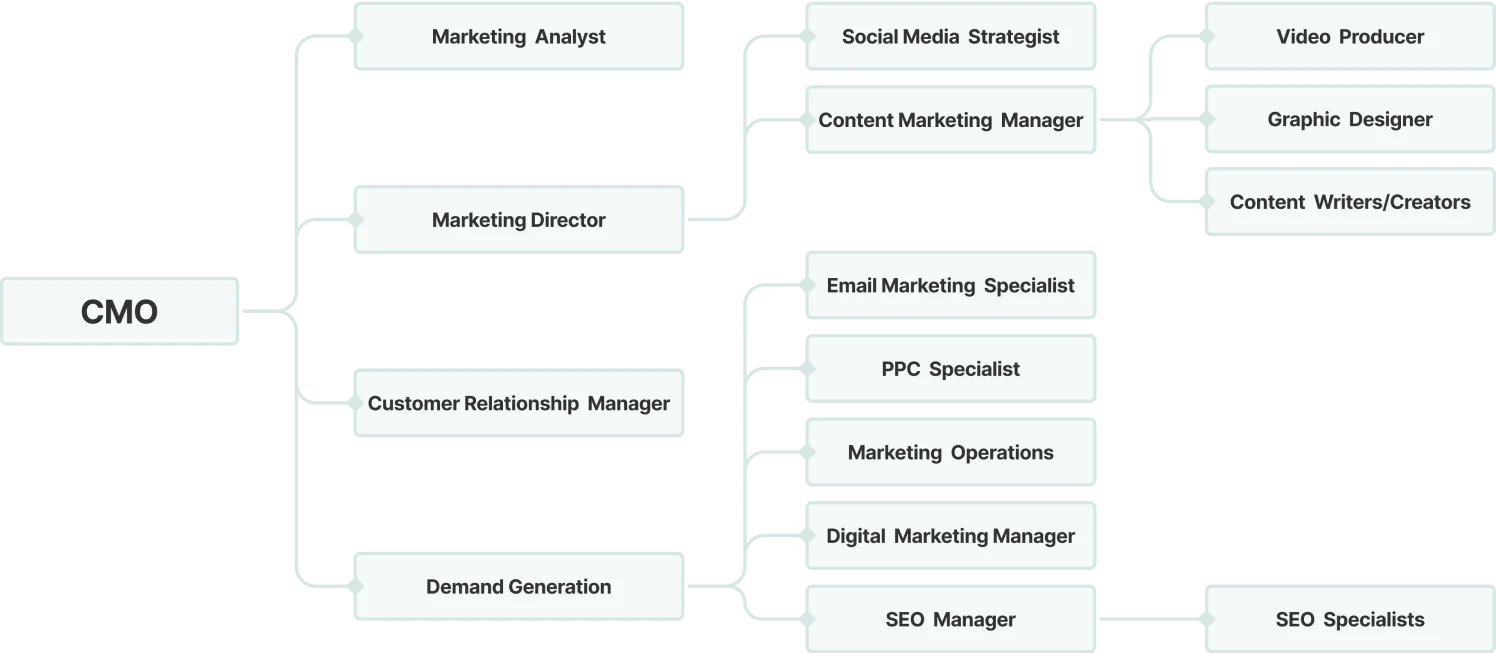Optimize your marketing team structure and marketing org chart for efficiency, specialization, scalability, and strategic alignment.
The structure of your marketing team can significantly influence your businesses ability to drive growth, innovate, and stay ahead of the competition. This guide looks at the best marketing team setup for a variety of businesses. It shows how small, medium, and large businesses differ and gives examples of important roles.
A good marketing team is important for your company’s success, not just for daily tasks but also for long-term strategy. A robust marketing team structure ensures efficiency, specialization, scalability, and alignment with business goals. By planning carefully, you can create a marketing organizational chart that meets current needs and prepares for future challenges and opportunities.
The Importance of a Well-Structured Marketing Team
The importance of a well-structured marketing team cannot be overstated. Effective task allocation within a well-defined structure enhances efficiency by reducing overlap and increasing overall productivity. Each team member can focus on their specific area of expertise, resulting in higher quality work and better outcomes. This leverages the unique strengths of each individual, ensuring the team operates at its best.
Scalability is a big advantage for structured teams because they can grow without losing efficiency. A well-organized marketing team structure ensures that all efforts are aligned with the business strategy and goals, creating a unified approach across the business.

Key Considerations for your marketing team structure
Before diving into specific roles, it’s important to consider a few factors that influence marketing team structure
Company Size
The size of your business determines the breadth & depth of your marketing team.
Budget
Financial resources available for hiring & marketing activities.
Goals & Objectives
Specific business goals you aim to achieve through marketing.
Market & Industry
The dynamics of your market & industry can dictate the types of roles & expertise needed.
Marketing Team Structure for Small Businesses

Characteristics of Small Business Marketing Teams
- Lean and Agile: Typically have fewer team members who wear multiple hats.
- Cost-Effective: Limited budget necessitates maximizing resources.
- Flexible: Quickly adapt to changes and new opportunities.
Key Roles in Small Business Marketing Teams
- Marketing Manager: Oversees all marketing activities, sets strategies, and coordinates the team. In small businesses, this person often executes many of the tasks themselves.
- Content Creator: Produces written, visual, and multimedia content for various channels including blogs, social media, and email.
- Social Media Manager: Manages social media accounts, engages with followers, and runs social media campaigns.
- SEO Specialist: Focuses on optimizing the company’s website and content for search engines to increase organic traffic.
- Marketing Analyst: Analyzes marketing data to provide insights and recommendations, tracks KPIs, and measures campaign effectiveness.
- Graphic Designer: Creates visual content for digital and print media, ensuring brand consistency across all channels.
- Customer Relationship Manager (CRM): Manages customer data, segments audiences, and oversees email marketing campaigns.
Example Structure for a Medium-Sized Business

Marketing Team Structure for Enterprise Businesses

Characteristics of Enterprise Business Marketing Teams
- Highly Specialized Roles: Teams are segmented into highly specialized roles with deep expertise in specific areas.
- Complex Structure: Larger, more complex teams with multiple layers of management.
- Global Reach: Often includes regional teams to handle marketing efforts across different geographies
Key Roles in Enterprise Business Marketing Teams
- Chief Marketing Officer (CMO): Sets the global marketing strategy, leads the marketing department, and works closely with other C-suite executives.
- Vice President of Marketing: Supports the CMO, oversees large segments of the marketing team, and focuses on strategic initiatives.
- Director of Brand Marketing: Manages brand strategy and ensures consistent messaging across all channels.
- Director of Digital Marketing: Oversees all digital marketing activities including web, social, email, and online advertising.
- Content Strategy Director: Develops the content strategy and oversees a large team of content creators and editors.
- Global SEO Director: Manages international SEO efforts, coordinates with regional teams, and ensures implementation of global SEO strategies.
- Social Media Director: Leads social media strategy, oversees a global team of social media managers, and ensures consistent brand presence across platforms.
- Performance Marketing Director: Focuses on performance-driven marketing campaigns, including PPC, affiliate marketing, and conversion rate optimization.
- Marketing Operations Director: Manages marketing technology stack, automation, and processes to ensure efficiency and effectiveness.
- Customer Insights Director: Leads market research efforts, analyzes consumer data, and provides insights to inform marketing strategies.
Example Structure for an Enterprise Business

Aligning Marketing Team Structure with Business Goals

Your marketing team should closely align its structure with your business goals and objectives. No matter the size of your business, having the right team structure is essential for success.
Small Business Goals
Small businesses focus on making people know their brand, getting new customers, and being visible online. Having a small team with diverse skills is important for quickly adapting to new opportunities and challenges. It’s crucial to have a marketing manager who can handle different tasks and lead various projects.
Medium-Sized Business Goals
Medium-sized businesses typically aim to scale their operations, optimize marketing strategies, and drive sustained growth. Specialization is important. There are specific roles for creating content, digital marketing, and analytics. Experts in their respective fields manage each part of the marketing strategy.
Enterprise Business Goals
Enterprise businesses focus on maintaining their market leadership, expanding globally, and driving continuous innovation. Complex, highly specialized teams with clear hierarchies and regional coordination are necessary to manage extensive marketing efforts across different geographies and channels. Leadership roles like CMO, Vice President of Marketing, and various directors ensure strategic alignment and effective execution.
Building a Future-Ready Marketing Team

The marketing landscape is evolving, driven by technological advancements, changing consumer behaviors, and new industry trends. Building a future-ready marketing team requires a commitment to ongoing learning, adaptability, and strategic foresight.
Embracing Technology
Investing in the latest marketing technologies and tools is crucial for staying competitive. Marketing operations directors and technology specialists play a key role in integrating these tools into the marketing strategy, ensuring efficiency and effectiveness.
Fostering Innovation
It’s important to promote innovation in the marketing team to come up with creative solutions and stay ahead. Regular training, workshops, and a collaborative environment can foster innovation and continuous improvement.
Data-Driven Decision Making
Leveraging data and analytics to inform marketing strategies is more important than ever. Marketing analysts and customer insights directors provide valuable data-driven insights that help shape marketing campaigns, optimize performance, and enhance customer engagement.
Creating a strong marketing team is crucial for digital companies to succeed in a competitive market. Rocket Talent, with its deep industry expertise and innovative approach, stands ready to assist organizations in building world-class marketing teams tailored to their unique needs. No matter the size of your business, we are dedicated to helping you succeed. We provide the skills and organization necessary for growth, creativity, and long-term success.
Partner with Rocket Talent today and embark on a transformative journey towards building a marketing team that not only meets your current needs but is also poised to tackle future challenges and opportunities. With a good team, your organization can reach great success faster.



